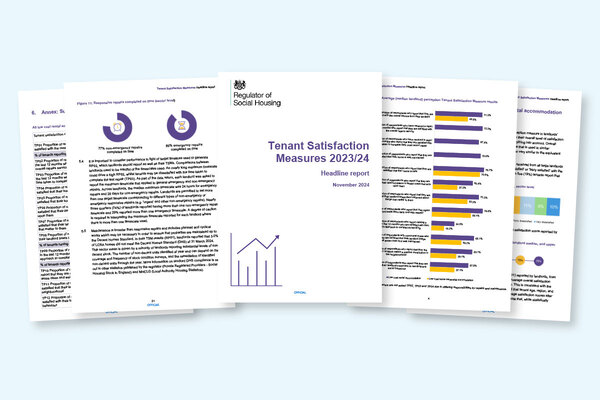You are viewing 1 of your 1 free articles
Complaint-handling is a cultural issue
Richard Blakeway, the housing ombudsman, discusses the lessons to the learned from the tenant satisfaction measures, the ombudsman’s annual review and the first monitoring report on the statutory Complaint Handling Code
This month, three publications offered stark lessons on complaint-handling within social housing. Collectively, they must be read as an urgent call for action, but it is not all doom and gloom.
Yes, there are clear messages that need to be heeded from the TSMs, our annual review and the first monitoring report on the statutory Complaint Handling Code. Trust is fragile.
Yet, despite the challenges, I believe the sector can become an exemplar in this area and most landlords are better today than before.
A major focus for our next corporate strategy, which we will consult on next year, is how we can support landlords to strengthen local complaint-handling culture further.
There are many ways we can do this, from our appraisal of landlord self-assessments on the code, using early resolution to help rebuild trust between parties, developing our investigation reports to highlight more clearly learning points for landlords (and what went well), and turbocharging our Centre for Learning. With 600 formal investigations being completed each month by our service, the insight is there to help resolve complaints earlier and prevent them arising.
A key part of making this work is the role of the ‘members responsible for complaints’ (MRCs) sitting on each governing body. We recently met 200 MRCs in Manchester to share insights and approaches to the role. Here are three suggestions for landlords to build trust in their complaints procedures.
“Transactions see landlords focusing on the individual resident to the exclusion of learning. It may display defensiveness when responding to ombudsman decisions”
First, moving complaints from individual transactions to organisational learning. In Manchester I shared the idea of the learning pyramid. Imagine that classic triangle with four layers, representing the complaint culture of the organisation. At the bottom is transactional; above it, operational; then strategic; and at the top cultural.
Most landlords will be transactional or operational. Transactions see landlords focusing on the individual resident to the exclusion of learning. It may display defensiveness when responding to ombudsman decisions: the compensation is too high, the case is old, it doesn’t match a different finding.
Operational is better, and where most landlords will be, with some operational changes made to avoid repeating the same mistakes: training staff or changing processes. But it is largely owned by officers without engaging the senior executive or governing body, and the benefits may be short-lived because of staff turnover or other changes.
Next is strategic, which sees complaints being used to connect to other data and programmes and open up debates on ‘first principles’. Damp and mould would exemplify this. It will see root cause analysis, something we have encouraged through our wider orders; discussion of approaches to emerging risks; and insights aligned to other activities, such as internal audit.
Complaints may be used to identify weaknesses in knowledge and information management and assurances. Not only will the resources of a complaints team be considered, but also whether it has the authority within the organisation to have a wider impact.
At the top is cultural, and where every landlord should aim. This means that strategic approach to complaints is proactive, rather than a reaction to external pressure, as well as complaints intelligence being used to test organisational culture, values and behaviours.
“Complaints may be used to identify weaknesses in knowledge and information management and assurances. Not only will the resources of a complaints team be considered, but also whether it has the authority within the organisation to have a wider impact”
Every MRC could facilitate an open and honest discussion around the learning pyramid and trajectory to the apex.
Second, landlords must ensure they do not have informal complaint-handling – something which we can see in our casework. Complaints can be under-reported because of ‘ghost’ stages before, after and between the formal two stages.
Decentralised handling models can be especially prone to informality. This means governing bodies do not see the scale of complaints, residents fall between gaps, expectations are mismanaged and valuable learning is missed. MRCs should seek assurance that informal processes are not occurring.
Finally, honour commitments. We are seeing cases escalate even where the right remedy was found because it remains unfulfilled. Our investigation reports frequently detail multiple missed opportunities and in 2023-24 we ordered more than 3,000 repairs and similar interventions, such as a property inspection, which could have been completed before our involvement.
Enhanced oversight is especially important where cases are more complex. For example, this month I saw cases where repairs were raised with a contractor the landlord had not employed for six months, and works were closed on the system despite not being raised.
MRCs could commission a review into whether tasks are being completed in the complaints process and examine any system or internal communication issues. This could also be the route to preventing complaints even being raised, as well as avoiding escalations.
Alongside redress, the ombudsman’s role is to promote accountability and learning. There are lots of ways we can engage landlords to build trust and fairer services. Despite the challenging landscape, since the Complaint Handling Code became statutory, the response from the sector shows it has energy, commitment and talent to get there, with transformative benefits for both residents and staff.
Richard Blakeway, housing ombudsman
Sign up for our regulation and legal newsletter
Already have an account? Click here to manage your newsletters












